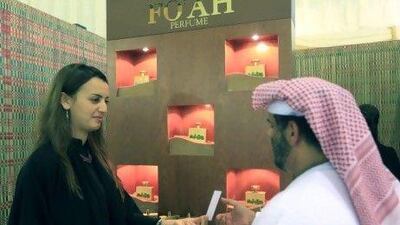LIWA // When the palm-tree perfume reached the nose of Bardan Al Anasi he began to recite poetry praising the eyes, cheeks and hair of women, comparing their beauty to Moroccan gazelles.
"This perfume is sweet," said Mr Al Anasi, 75. "But not as sweet as women. I like women's fragrances."
His friend walked away mumbling: "It always goes like that - beauty, a nice smell and poets."
The men were among the first to smell the country's newest perfume, based on one of its oldest scents. Fo'ah, a date-palm line, will be launched in September.
"What we wanted to do is concentrate and deliver a range of fragrances that was an honour to the emblematic palm tree of the UAE," Emilie Dewell, the general manager of AM Perfume, said at the Liwa Date Festival last week. "We wanted to explain why the tree of life is so important to this region."
The Abu Dhabi businessman Abdulla Al Masaood had dreamed of a palm-scented perfume for years before he contacted the French perfumer Givaudan to create his dream fragrance.
AM Perfume's five fragrances - one for men and four for women - are all based on the scent of the date palm, phoenix dactylifera.
It took two years to create a perfume that honours a national symbol of virility and hospitality.
"This is where the perfumists came in," Ms Dewell said. "We flew them in from France and we said this is what we would like."
The creators placed the date palm's fronds, husk and tiny flowers under a bell jar to analyse its natural fragrance in the desert air, thenrecreated the scent at laboratories in France.
It is a method that is preferred to old-fashioned extraction and distillation, which can alter the plant's natural scent.
"It's the best recreation of the palm in its natural environment," Ms Dewell said.
The final product is the scent of the palm as a whole, not simply its fronds and fruit. Ms Dewell calls it "whole palm tree experience".
The men's fragrance is the "emblematic scent" - the palm prototype. The four scents for women were created around a base of 30 or 40 submissions. In each, the palm is the middle note of the perfume and its lasting scent.
Ms Dewell's choice is Fo'ah 23, a "green and dry" scent with galbanum resin. Fo'ah 11 marries the palm with the scent of the Venezuelan tonka bean.
The favourites are combinations with classics long popular in the Gulf: Fo'ah 8 has French rose and Fo'ah 14 uses oud wood and cinnamon.
Liwa Date Festival visitors were amongst the first tosample the fragrances before their retail launch.
"Blossoms," said Bakheet Suhail Al Mazrouei, a 56-year-old farmer, misting her arm with Fo'ah 8. "I know that this is from the palm's blossoms. I used to climb the trees and pick the fruit myself."
But an Iraqi visitordismissed the results of two years of research with a sniff.
"It does not smell like date," said Dr Samir Al Shakir, an international consultant for Date Palms Technology. The perfect palm perfume, he argued, ought to smell of its pollen.
"That smell is very nice, I cannot explain to you why," said Dr Al Shakir. "It's like the man. The man smell. Exactly. The man."
His colleague, Dr Hasan Shabana disagreed, comparing the scent to the "sweet and tasty" heart of the palm tree, the bulge at its top.
After much debate, they concluded that the palm's perfect scent would be found in the variety of its fruit, like sukari or zahadi.
"Do I want to smell like a date?" exclaimed Dr Al Shakir, his views decided. "Like sukari I do."
Bottled in gold-capped jars, the fragrances will sell for Dh1,080 for 100ml and Dh780 for 50ml.

